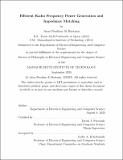Efficient radio frequency power generation and impedance matching
Author(s)
Al Bastami, Anas Ibrahim.
Download1227515980-MIT.pdf (12.66Mb)
Other Contributors
Massachusetts Institute of Technology. Department of Electrical Engineering and Computer Science.
Advisor
David J. Perreault.
Terms of use
Metadata
Show full item recordAbstract
A wide range of applications require the efficient generation and delivery of radio-frequency (rf) power to do useful work. This is commonly achieved by utilizing an rf power amplifier or inverter that delivers the required amount of power to the load. In many applications, the load impedance varies widely due to changes in the operating conditions. A key challenge in these rf power delivery systems is attaining high efficiency and performance across all operating conditions, including accurate control of the delivered power, and achieving wide bandwidths with respect to power delivery and/or load variation. Typical rf amplifiers and inverters operate efficiently into a fixed load resistance, but their performance heavily degrades with variations in load impedance. This problem is often addressed through tunable matching networks (TMNs), which provide adaptive impedance transformation between the rf source and load. However, they become costly, bulky, and slow in response to load changes, especially at high power levels (hundreds to thousands of watts and above). This thesis develops solutions for efficient generation and delivery of rf power into dynamically-varying loads, with a focus on systems suitable for plasma generation at power levels from hundreds of watts to tens of kilowatts. It presents an efficient, low cost, and small size alternative to a TMN that achieves acceptable impedance matching for inductively-coupled rf plasma systems. It also develops techniques that enable the design of an efficient high power TMN capable of very fast modulation of impedance. In addition, this thesis explores different architectural implementations for complete rf generation and power delivery systems that are efficient, fast, and capable of driving a wide load range with accurate control of power, and identifies the most promising implementations. While the solutions in this thesis are demonstrated in the context of plasma generation systems, they can be applied to many other systems having dynamically-varying rf loads.
Description
Thesis: Ph. D., Massachusetts Institute of Technology, Department of Electrical Engineering and Computer Science, September, 2020 Cataloged from student-submitted PDF of thesis. Includes bibliographical references (pages 249-261).
Date issued
2020Department
Massachusetts Institute of Technology. Department of Electrical Engineering and Computer SciencePublisher
Massachusetts Institute of Technology
Keywords
Electrical Engineering and Computer Science.